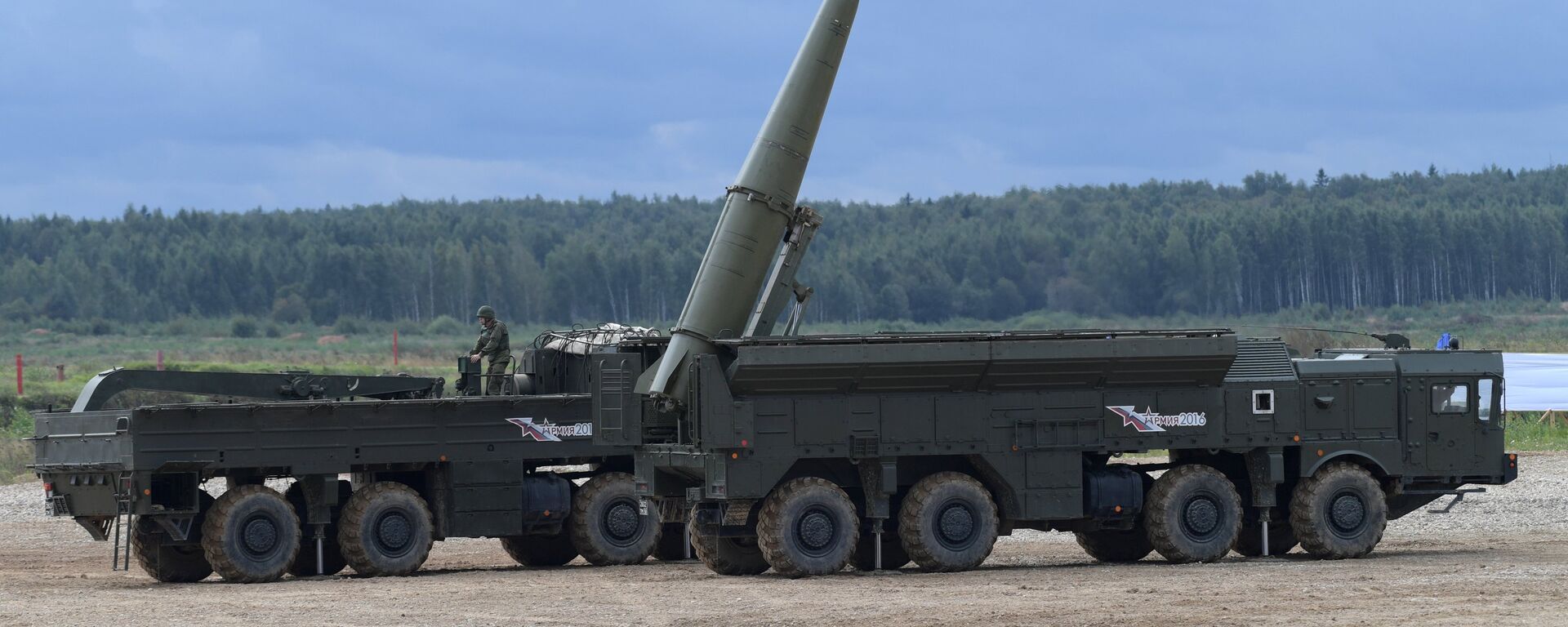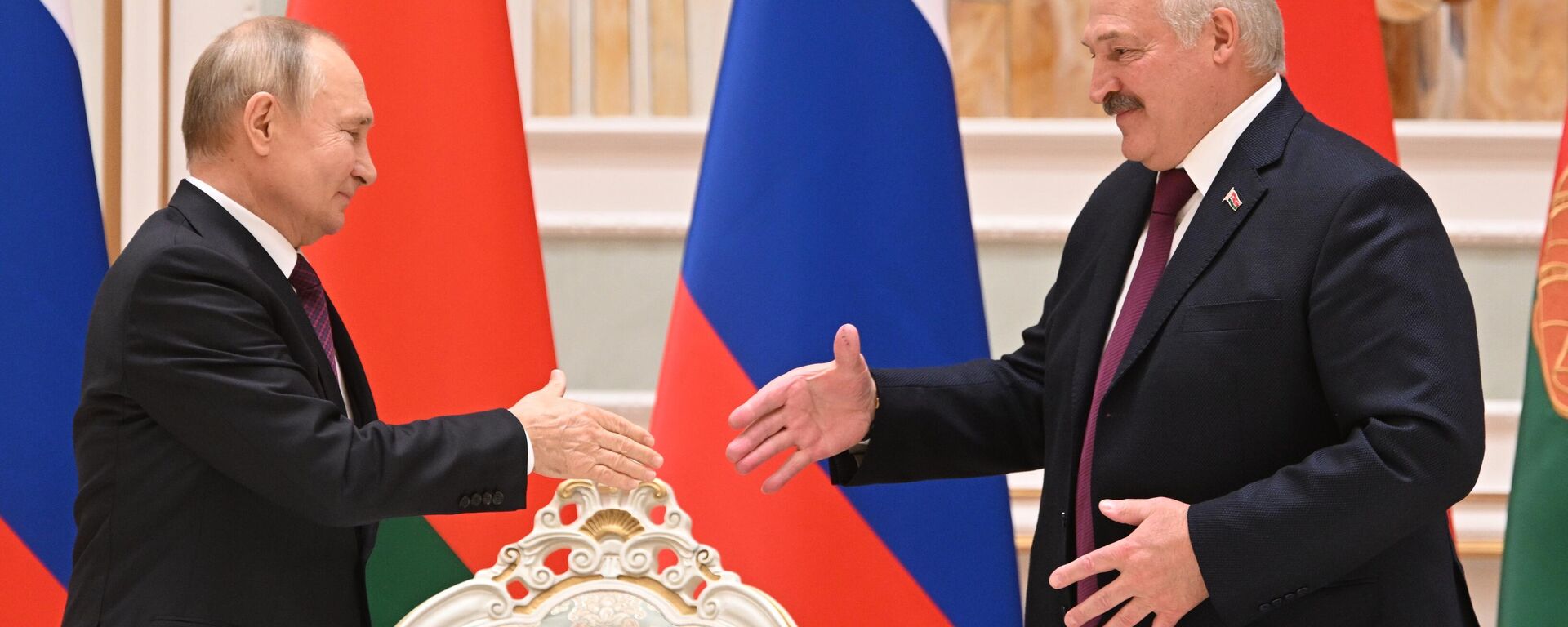https://sputnikglobe.com/20230406/security-concept-of-russia-and-belarus-union-state-seeks-to-thwart-nato-threat-1109219406.html
Security Concept of Russia and Belarus Union State Seeks to Thwart NATO Threat
Security Concept of Russia and Belarus Union State Seeks to Thwart NATO Threat
Sputnik International
The creation of a security concept of the Union State of Russia and Belarus is a logical response to NATO's military buildup, Vladimir Kireev, deputy director... 06.04.2023, Sputnik International
2023-04-06T18:11+0000
2023-04-06T18:11+0000
2023-04-06T18:11+0000
analysis
us
europe
russia
belarus
union state
nato
tactical nuclear weapons
iskander
iskander-m
https://cdn1.img.sputnikglobe.com/img/107966/42/1079664283_0:160:3072:1888_1920x0_80_0_0_3005a5265b73ce96e3b6e9e94285b765.jpg
On April 6, Russian President Vladimir Putin and his Belorussian counterpart Alexander Lukashenko participated in a meeting of the Union State’s Supreme State Council. The summit's agenda included the Union State's strategic planning, security and conditions for sustainable socio-economic development of the supranational political body. Putin emphasized the necessity of working out a security concept of the Union State to withstand growing tensions on external borders of Russia and Belarus, the pressure of sanctions and ongoing information war unleashed by the West on Moscow and Minsk.Kireev suggested that the concept would include responses at political, economic, cyber-security and military levels, adding that a direct confrontation between the Union State and the transatlantic alliance cannot be ruled out. The expert noted that over recent years, a bipolar system has been forming with NATO steadily expanding towards the borders of Russia and Belarus, something that Moscow and Minsk cannot ignore. In addition, Western countries repeatedly issued threats towards the leaders of the Union State, the political scientist stressed.The West has subjected Moscow and Minsk to harsh criticism over Russia's decision to place tactical nuclear weapons in Belarus. Moscow made it clear that the deployment is by no means violating Russia's non-proliferation obligations. Earlier, the Russian Defense Ministry announced that Belarus had received nuclear-capable Iskanders while the nation's warplanes had the capability of striking enemy targets with nuclear means of destruction. On April 6, French President Emmanuel Macron vehemently opposed the proliferation of nuclear weapons outside the countries possessing them during a news conference on Thursday following talks with Chinese President Xi Jinping. Commenting on Macron's remarks, Lukashenko cited the fact that a whopping five European states are currently hosting US nuclear bombs, adding that these weapons should be pulled out from the Old Continent.
https://sputnikglobe.com/20230405/russian-iskanders-in-belarus-is-response-to-natos-expansion-and-militarization-of-europe-1109177086.html
https://sputnikglobe.com/20230403/belarus-to-emphasize-partnership-with-russia-china-in-national-security-concept-1109092214.html
russia
belarus
ukraine
Sputnik International
feedback@sputniknews.com
+74956456601
MIA „Rosiya Segodnya“
2023
News
en_EN
Sputnik International
feedback@sputniknews.com
+74956456601
MIA „Rosiya Segodnya“
Sputnik International
feedback@sputniknews.com
+74956456601
MIA „Rosiya Segodnya“
union state of russia and belarus, security concept of union state, alexander lukashenko and vladimir putin, russian tactical nuclear weapons in belarus, us tactical nuclear weapons in europe, russian special military operation in ukraine, nato military buildup in europe, nato militarization of europe, finland nato membership, nato eastward expansion
union state of russia and belarus, security concept of union state, alexander lukashenko and vladimir putin, russian tactical nuclear weapons in belarus, us tactical nuclear weapons in europe, russian special military operation in ukraine, nato military buildup in europe, nato militarization of europe, finland nato membership, nato eastward expansion
Security Concept of Russia and Belarus Union State Seeks to Thwart NATO Threat
The creation of a security concept of the Union State of Russia and Belarus is a logical response to NATO's military buildup, Vladimir Kireev, deputy director of the Center of Social and Integration Studies on the Union State and Eurasian Integration, told Sputnik. He added that the time is ripe to develop algorithms to overcome the challenge.
On April 6, Russian President Vladimir Putin and his Belorussian counterpart Alexander Lukashenko participated in a meeting of the Union State’s Supreme State Council.
The summit's agenda included the Union State's strategic planning, security and conditions for sustainable socio-economic development of the supranational political body.
Putin emphasized the necessity of working out
a security concept of the Union State to withstand growing tensions on external borders of Russia and Belarus, the pressure of sanctions and ongoing information war unleashed by the West on Moscow and Minsk.
"The initiative has been proposed in the face of high foreign policy risks: we see that a rather dangerous situation is emerging for Russia and Belarus in the international arena," said Kireev. "Against the background of the consolidation of NATO countries against Russia, a certain consensus has been reached in Ukraine that the NATO member states agree to participate in one way or another in an indirect or even direct conflict against the Union State by military and non-military means (…) This concept is, in fact, a regulated and formalized scheme of interaction between the two countries in response to external threats (…) [T]hese are retaliatory measures in response to [Western] aggression, we did not start it. For now, [it's hard] to say what will be exactly included in this concept, but this will definitely improve the coordination of the actions of the joint mechanism of cooperation between Belarus and Russia."
Kireev suggested that the concept would include responses at political, economic, cyber-security and military levels, adding that a direct confrontation between the Union State and the transatlantic alliance cannot be ruled out. The expert noted that over recent years, a bipolar system has been forming with NATO steadily expanding towards the borders of Russia and Belarus, something that Moscow and Minsk cannot ignore. In addition, Western countries repeatedly issued threats towards the leaders of the Union State, the political scientist stressed.
"We can see a vast variety of methods [employed by the West – Sputnik] to influence Russia and Belarus ranging from political and economic means to various military provocations, such as entering the airspace of our countries, deploying military contingents directly near our borders. At the same time, we are now talking about growing [military] contingents [of NATO], which did not really threaten our security 10-15 years ago being at the time purely symbolic. At the moment, a real offensive army is being formed in Poland and in the Baltic states. That is, given that there are 150,000 troops in Poland and they plan to increase this contingent to 300,000, then collectively all NATO troops, including new NATO members such as Sweden, Finland and slightly more experienced ones, such as Romania, Bulgaria, would comprise a really large grouping, which is already enough to wage a full-scale war against the Union State of Belarus and Russia."
The West has subjected Moscow and Minsk to harsh criticism over Russia's decision to place tactical nuclear weapons in Belarus. Moscow made it clear that the deployment is by no means violating Russia's non-proliferation obligations. Earlier, the Russian Defense Ministry announced that Belarus had received nuclear-capable Iskanders while the nation's warplanes had the capability of striking enemy targets with nuclear means of destruction. On April 6, French President Emmanuel Macron vehemently opposed the proliferation of nuclear weapons outside the countries possessing them during a news conference on Thursday following talks with Chinese President Xi Jinping. Commenting on Macron's remarks, Lukashenko cited the fact that a whopping five European states are currently hosting US nuclear bombs, adding that
these weapons should be pulled out from the Old Continent.
"European leaders are certainly concerned about the dangerous situation that is emerging in the European continent because of the conflict in Ukraine, which is largely fueled by the US and a certain part of the American political elites," said Kireev. "But at the same time, if this conflict translates into real hostilities, it risks dealing a serious blow not only to the economy of the European Union, but also to the life on the continent: if nuclear weapons are used as a result of hostilities, then it will be very difficult to exist [there] in the future (…) Reproaches against Russia, are in fact emotionally addressed at the United States, too. Of course, Russia's actions complicate the situation for the EU and NATO. However, in principle, there is no other way out for Russia, because in the current situation, the threat of a direct military conflict between NATO and the Russian Federation looks close and frightening like never before and cannot but arouse the desire of the Russian Federation to at least somehow mitigate risks posed by NATO through various methods, including the deployment of tactical nuclear weapons in Belarus and the creation of this common security concept."






